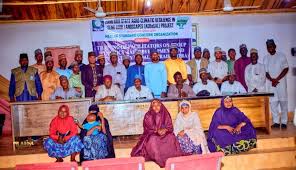The Zamfara State Focal Nongovernmental Health Standard Concern Organization (HESCO), in partnership with the Agro-Climatic Resilience in Semi-Arid Landscapes (ACReSAL) project, has concluded a comprehensive training program aimed at equipping community facilitators with essential skills in group dynamics, development, and participatory rural appraisal (PRA).
The capacity-building workshop brought together 55 participants drawn from two catchment communities across three Local Government Areas—Bungudu, Gusau, and Kaura Namoda. The initiative seeks to strengthen grassroots engagement and promote sustainable development through inclusive and participatory approaches.
The training focused on empowering facilitators to drive active community participation, foster trust and cooperation among stakeholders, and apply inclusive strategies in decision-making processes. Through interactive sessions, role-playing, and group exercises, participants were equipped with practical tools for promoting collaboration and resolving conflicts within their communities.
Executive Director of HESCO, Abdullahi Lawali Bungudu, while addressing participants, underscored the importance of applying the knowledge gained to ensure the project’s success at the community level.
“For the ACReSAL project to succeed, facilitators must prioritize inclusivity and equal opportunity during deliberations. Every voice matters. It is your responsibility to foster trust, resolve conflicts, and ensure that the views of all community members are heard and respected,” he stated.
Also speaking at the event, Zamfara State Project Coordinator of ACReSAL, Malam Nasiruddeen Bello, reiterated the project’s commitment to building resilient communities through participatory processes and effective group coordination.
He noted that the training covered core areas such as the principles of PRA, group dynamics, the responsibilities of facilitators, and techniques for mobilizing and cascading knowledge within communities.
“This training is an essential step in empowering our facilitators to serve as change agents. Their ability to apply what they’ve learned will be critical in strengthening the resilience and sustainability of our communities,” Bello added.
The ACReSAL project, a World Bank-assisted initiative, aims to address environmental degradation and enhance climate resilience in Nigeria’s semi-arid regions through integrated and community-driven solutions.
















